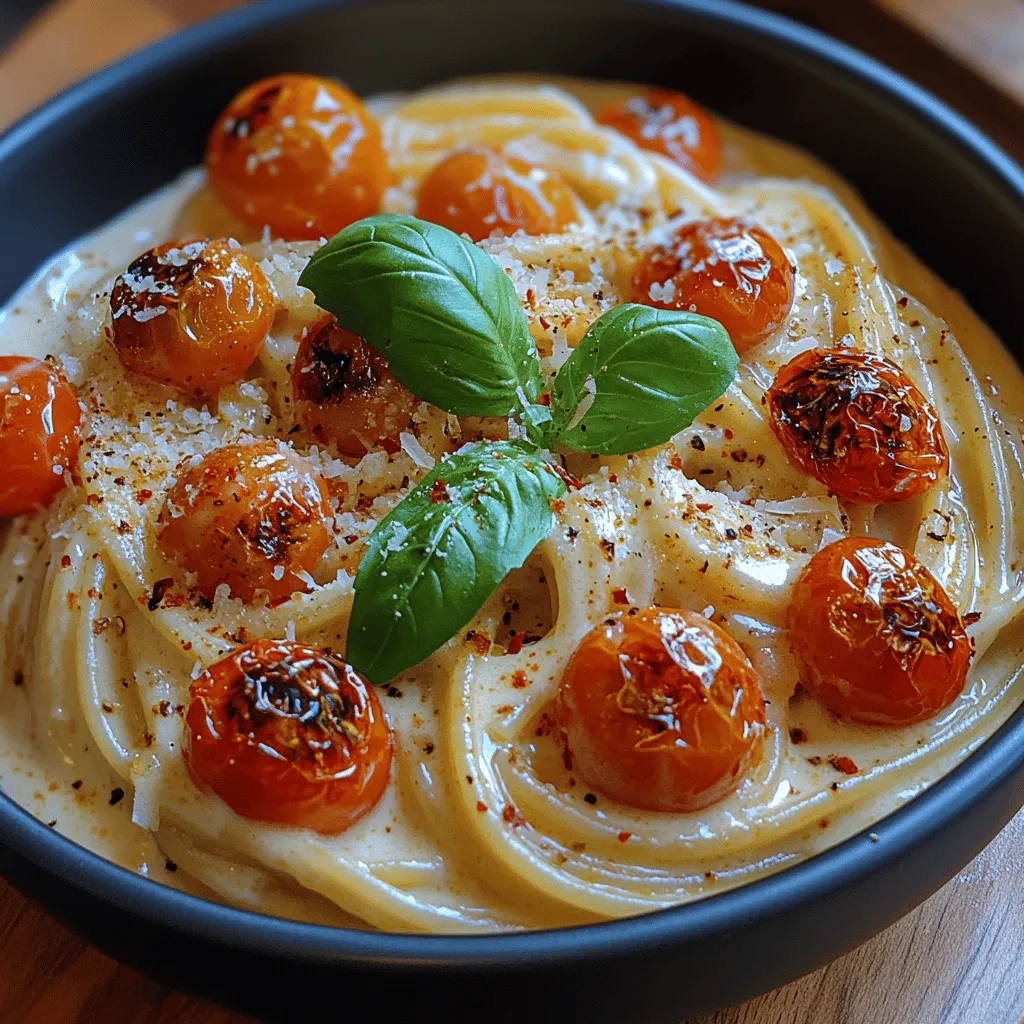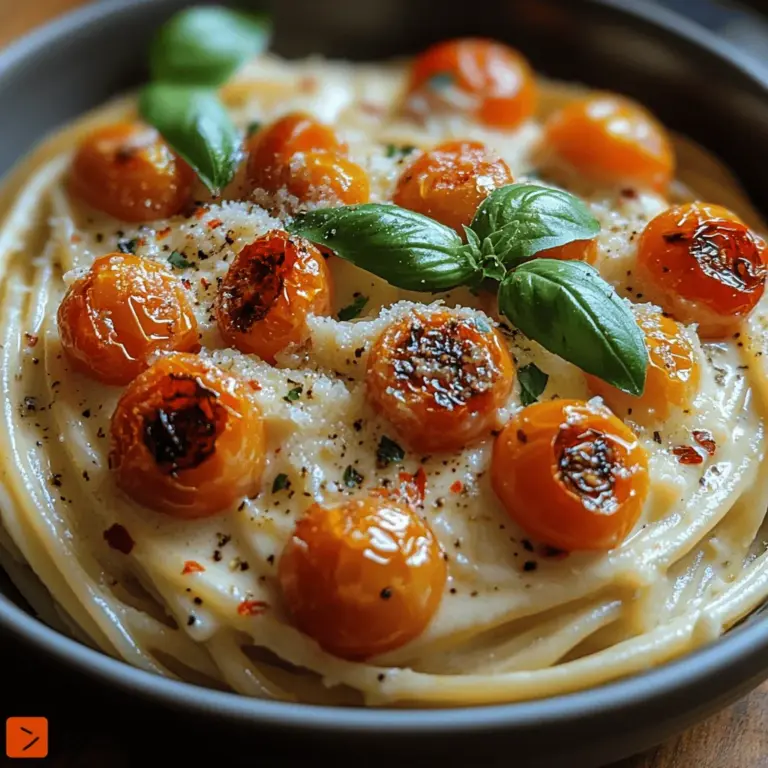If you are searching for a dish that perfectly marries simplicity and flavor, look no further than Creamy Roasted Tomato Pasta. This delightful recipe is a celebration of fresh, wholesome ingredients coming together to create a comforting meal that is as satisfying as it is delicious. Whether you are preparing a cozy dinner for two or hosting a dinner party for friends and family, this creamy pasta dish is versatile enough to suit any occasion.
The Allure of Creamy Roasted Tomato Pasta
Creamy Roasted Tomato Pasta is more than just a meal; it’s a comforting embrace on a plate. The combination of sweet, roasted tomatoes with the richness of cream creates a flavor profile that is both comforting and indulgent. The slight acidity of the tomatoes is beautifully balanced by the cream, while the addition of garlic and herbs enhances the dish’s overall depth, making each bite a delightful experience.
One of the most appealing aspects of creamy pasta dishes is their ability to satisfy the soul. After a long day, there’s nothing quite like twirling your fork around a bowl of luscious pasta, the creamy sauce coating every strand. This recipe is designed to evoke that sense of comfort, while still being incredibly easy to prepare, ensuring that you can enjoy it whenever the craving strikes.
Fresh, high-quality ingredients are key to elevating this dish. The tomatoes are the star of the show, and using fresh cherry tomatoes instead of canned ones makes a significant difference in flavor. The sweetness of the roasted tomatoes is intensified through the roasting process, creating a rich and savory sauce that is simply irresistible.
Ingredients Overview
Cherry Tomatoes
The heart of this dish lies in the cherry tomatoes. These small, vibrant fruits are not only visually appealing but also pack a punch of flavor. When roasted, their natural sugars caramelize, creating a sweetness that complements the creamy sauce perfectly. Opting for fresh cherry tomatoes over canned varieties ensures that you are getting the best taste and texture. Fresh tomatoes have a crisp and juicy quality that canned tomatoes simply cannot replicate, making them the ideal choice for this recipe.
Olive Oil
Olive oil plays a crucial role in this dish, both for roasting the tomatoes and for enhancing the overall flavor. A good quality extra virgin olive oil will impart a fruity, peppery note that complements the sweetness of the tomatoes. When roasting, the oil helps to caramelize the tomatoes, allowing for a deeper, richer flavor. Be generous with the olive oil, as it not only adds flavor but also helps to achieve the perfect texture in the final dish.
Garlic
Garlic is the aromatic hero of this recipe, providing depth and warmth to the sauce. The fragrant cloves are roasted alongside the tomatoes, allowing their flavors to meld beautifully. Garlic not only enhances the dish’s taste but also adds a layer of complexity that elevates the overall experience. As it roasts, garlic becomes sweet and mellow, balancing the acidity of the tomatoes and creating a harmonious flavor profile.
Oregano and Red Pepper Flakes
To bring even more depth to the dish, we incorporate oregano and red pepper flakes. Oregano, a classic herb in Italian cuisine, adds a warm, earthy note that complements the tomatoes and garlic. It brings a sense of familiarity and comfort to the dish, making it truly feel like a homemade meal. Meanwhile, red pepper flakes provide a gentle kick, elevating the flavors and giving the dish a hint of heat. Adjust the amount based on your spice tolerance to achieve the perfect balance for your palate.
Heavy Cream and Parmesan
The creaminess factor of this dish comes from heavy cream and freshly grated Parmesan cheese. Heavy cream transforms the roasted tomato mixture into a velvety sauce that envelops the pasta, creating a rich and luxurious mouthfeel. Parmesan adds a nutty, salty flavor that enhances the overall richness of the dish. Together, these ingredients create a creamy sauce that is both indulgent and satisfying.
Pasta Choices
When it comes to pasta, the options are endless. While traditional choices like spaghetti or fettuccine work beautifully, you can also experiment with other types such as penne, fusilli, or even whole grain pasta for added texture and nutrition. The key is to choose a pasta shape that can hold onto the creamy sauce, ensuring that every bite is packed with flavor. Consider the dietary preferences of your guests, and don’t hesitate to swap in gluten-free pasta if needed.
Preparation Steps Explained
Preheating the Oven
Before you begin assembling your ingredients, it’s essential to preheat your oven to 400°F (200°C). This temperature is ideal for roasting tomatoes, allowing them to caramelize beautifully while still retaining their shape. A properly preheated oven ensures even cooking and optimal flavor development, making this step crucial for achieving the best results.
Roasting the Tomatoes
Next, it’s time to roast the stars of the dish—your cherry tomatoes. Start by rinsing them under cold water and patting them dry. In a mixing bowl, toss the tomatoes with a generous drizzle of olive oil, minced garlic, oregano, and a pinch of red pepper flakes. Spread the mixture evenly on a baking sheet lined with parchment paper, ensuring that the tomatoes are not overcrowded, which could lead to steaming instead of roasting.
Roast the tomatoes in the preheated oven for about 20-25 minutes. You’ll know they’re done when they are blistered and have released their juices, creating a beautiful, rich sauce. Keep an eye on them during the final minutes to avoid burning; the goal is to achieve a perfect caramelization that enhances their natural sweetness.
Cooking the Pasta
While the tomatoes are roasting, bring a large pot of salted water to a boil. The salt is essential as it enhances the flavor of the pasta. When the water reaches a rolling boil, add your pasta of choice and cook according to the package instructions until al dente, usually 8-10 minutes.
Remember to reserve a cup of pasta water before draining the pasta. This starchy water is a secret weapon in making your sauce creamy and helps it cling beautifully to the pasta.
With the tomatoes roasting and the pasta cooking, you are well on your way to creating a dish that is sure to impress. Stay tuned for the next part, where we’ll dive into the final assembly of the Creamy Roasted Tomato Pasta and additional tips for achieving the best results.

Creating the Cream Sauce
To create the rich and creamy sauce that will envelop your roasted tomatoes and pasta, start by gathering your ingredients. You’ll need heavy cream, garlic, and Parmesan cheese—each contributing to the sauce’s depth and flavor.
1. Sauté Garlic: Begin by heating a tablespoon of olive oil in a medium saucepan over medium heat. Add minced garlic (about 3-4 cloves) to the pan, stirring frequently until fragrant. This should take about 1-2 minutes. Be careful not to let it brown, as burnt garlic can impart a bitter taste to your sauce.
2. Add Cream: Once the garlic is fragrant, pour in 1 cup of heavy cream. Stir continuously to combine the garlic and cream, allowing the mixture to gently simmer. Keep the heat low to avoid boiling, which can cause the cream to separate.
3. Incorporate Cheese: After the cream has warmed through, gradually whisk in 1 cup of freshly grated Parmesan cheese. Stir until the cheese melts completely into the cream, creating a smooth sauce. If the sauce appears too thick, you can add a splash of pasta water to reach your desired consistency.
4. Season the Sauce: Taste your sauce and add salt, freshly cracked black pepper, and a pinch of red pepper flakes if you enjoy a bit of heat. These seasonings enhance the richness of the sauce and balance the flavors beautifully.
Techniques for Achieving the Right Sauce Consistency
The key to a perfect cream sauce is achieving the right consistency. If your sauce is too thick, add additional pasta water or a little more cream to loosen it. Conversely, if it’s too thin, let it simmer for a few more minutes until it thickens. The sauce should coat the back of a spoon and remain creamy without being overly liquid.
How to Adjust Flavors for Personal Preference
Customization is one of the joys of cooking. If you prefer a tangier flavor, consider adding a splash of lemon juice or a teaspoon of balsamic vinegar. For a more herbal note, incorporate fresh or dried herbs like basil or thyme during the simmering process. Always taste your sauce as you go; this ensures that it meets your flavor profile before combining it with the pasta.
Combining Pasta and Sauce
Once your pasta is cooked to al dente, it’s time to combine it with your luscious cream sauce.
1. Toss the Pasta: Using tongs or a large spoon, transfer the cooked pasta directly into the saucepan with the cream sauce. Reserve a cup of pasta water before draining, just in case you need to adjust the consistency.
2. Mix Well: Gently toss the pasta in the sauce until every strand is evenly coated. This should take a minute or two. If your pasta seems dry, add a splash of the reserved pasta water, stirring until you achieve a creamy, cohesive dish.
3. Season and Taste: This is the perfect moment to check the seasoning. Adjust salt and pepper as necessary, ensuring the flavors are balanced and satisfying.
Serving Suggestions
Presentation can elevate your dish from ordinary to extraordinary.
– Plating: Use a pasta fork to twirl the creamy roasted tomato pasta onto each plate, creating an appealing nest shape. This not only looks professional but also makes it easier for your guests to serve themselves.
– Garnishing: Top the dish with fresh basil leaves for a pop of color and herbaceous aroma. Grate additional Parmesan cheese over the top for an extra touch of richness. A drizzle of high-quality olive oil can also add a glossy finish.
– Pairing: This creamy pasta pairs beautifully with a light white wine such as Pinot Grigio or Chardonnay. For sides, consider a simple arugula salad with lemon vinaigrette or crusty garlic bread to complete your meal.
Nutritional Information
Understanding the nutritional benefits of your ingredients can help you make informed eating choices.
– Nutritional Benefits: The key ingredients in creamy roasted tomato pasta provide several health benefits. Tomatoes are an excellent source of vitamins C and K, potassium, and folate. Heavy cream, while rich in calories, offers calcium and contributes to the dish’s satisfying texture.
– Caloric Breakdown: A standard serving of creamy roasted tomato pasta (about 1 cup) typically contains around 450-500 calories, depending on the exact quantities of cream and cheese used. Keep in mind that adding proteins or side dishes will alter this count.
– Dietary Modifications: If you’re looking to lighten the recipe, consider substituting heavy cream with half-and-half or a plant-based cream alternative. For a dairy-free option, use cashew cream or coconut milk, which will provide a different but delicious flavor profile.
The Versatility of Creamy Roasted Tomato Pasta
One of the best aspects of creamy roasted tomato pasta is its versatility. You can easily adapt this recipe to suit your dietary preferences or to incorporate seasonal ingredients.
– Adding Proteins: For a heartier meal, grilled chicken, shrimp, or even crispy bacon can be wonderful additions. Simply sauté or grill your protein of choice before adding it to the pasta and sauce.
– Vegetable Additions: To enhance the nutritional content, throw in fresh spinach, zucchini ribbons, or even sautéed mushrooms. These vegetables will not only boost the vitamins and minerals in the dish but will also add texture and flavor.
– Vegan or Dairy-Free Options: For those following a vegan diet, substituting the heavy cream with a nut-based cream will keep the dish creamy while adhering to plant-based principles. Nutritional yeast can replace Parmesan cheese, adding a cheesy flavor without the dairy.
Conclusion
Creamy roasted tomato pasta is not only a delightfully delicious dish but also an easy one to prepare. Its simplicity allows for creativity, encouraging you to experiment with flavors and ingredients that suit your palate. Whether you stick to the classic recipe or modify it to include your favorite proteins and vegetables, this dish is sure to become a staple in your meal rotation.
Homemade pasta dishes bring joy and warmth to the table, and this creamy roasted tomato pasta is no exception. We hope you give it a try and enjoy the process of making it your own. Don’t hesitate to share your variations and experiences, as cooking is all about personal expression and enjoyment!

